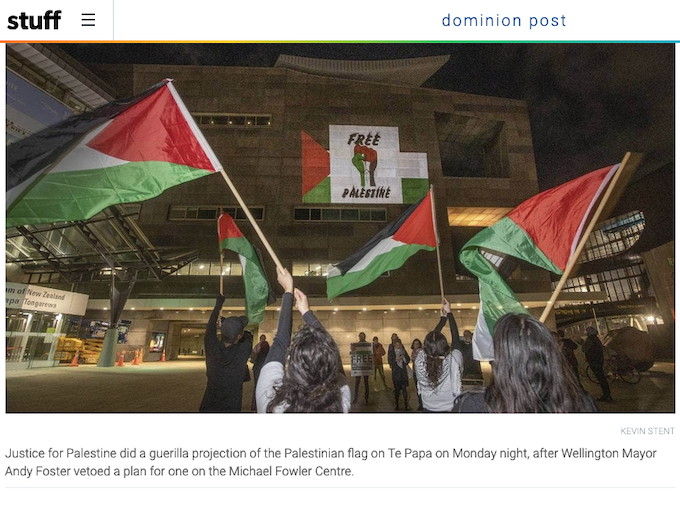COMMENTARY: Sh’ma Koleinu – Alternative Jewish Voices
When Marilyn Garson’s memoir of working in Gaza was published, Radio NZ scheduled an interview. On the day of the interview, RNZ first promoted and then cancelled it. In response to her OIA request, RNZ disclosed this internal email:

It reads in full, “Hi guys, given the huge flood of formal complaints we get any time we do a Palestine story without Israeli balance, [e]ither we have to drop it or set up another interview — which you would have to mention before and after tonights one.”
We hear about Israel casually, without always hearing from Palestine before and after. But we are not allowed to hear a first-person story of Gaza unless it is bookended by something, anything, from Israel. That’s not journalistic balance, that’s a one-way concession to the possible inconvenience of complaint.
- READ MORE: John Minto: NZ government and media must own up to their silence over Shireen Abu Akleh
- Behind the tears for Shireen, more evidence of Israel’s daily crimes with impunity
- Photos: Israeli forces attack Shireen Abu Akleh’s funeral
- APR Nakba gallery: Nakba Day in Auckland – protesting against Israel’s ‘ethnic cleansing’
- Other Shireen Abu Akleh reports
On Sunday, May 15, Nakba Day, Wellington Mayor Andy Foster was advised by the Ministry of Foreign Affairs and Trade (MFAT) to disallow an already-approved display of Palestinian colours on a public building.
Although the same building had recently displayed Ukrainian colours without evident concern for the Russian ambassador’s feelings, MFAT advised that “displaying the Palestinian colours could result in complaints from the Israeli ambassador and other Israeli groups.” The Mayor shut it down — leaving Justice for Palestine to get the job done on the following evening.
Again, Palestinian expression was forbidden because someone might complain. Forget the validity of the complaints – there were none to evaluate. The mere prospect of Palestinian stories or the display of a Palestinian flag was problematised in advance.
When the right to be Palestinian in public is made contingent, policy has become racially intolerant. We share this space and we are prevented from enjoying it equally. That makes the suppression of Palestine everyone’s issue.
MFAT’s advice angers us as Jews
MFAT’s advice is further inappropriate in ways that anger us as Jews. A government ministry issued advice that “displaying the Palestinian colours could result in complaints from the Israeli ambassador and other Israeli groups.”
The Israeli ambassador is a guest in Aotearoa, whose presence ought not to drive our municipal policy. Given the frequency with which his government is characterised as apartheid, and given the exceptional brutality it has displayed in the past week, he might benefit from seeing the healthy exercise of pluralist public expression.
See our joint open letter to the Prime Minister on the killing of Shireen Abu Akleh and the desecration of her funeral procession by Israeli police.
And exactly who are these “other Israeli groups” whose sensitivities preempt citizens’ peaceful public expression? Is Mossad operating here again? Or does a ministry of our own government truly not know the difference between the Jewish community of New Zealand and an Israeli interest group — can that possibly be??
MFAT, RNZ, Mayor Foster; we are Aotearoa Jews and you need to outgrow your stereotypes of our community.
Members of Aotearoa’s Jewish community express our identities in many ways. Some Jews place a nationalist project called Israel at the centre of their identity.
We and other Jews who love justice oppose the apartheid that Israel enacts in our names. We sharply distinguish it from our Jewish identity and we accept a responsibility to pursue justice and peace for all who live between the Jordan River and the Mediterranean Sea.
We hold equal citizenship
You do not aid Aotearoa’s Jews by marginalising our Palestinian neighbours. Do not prevent us from sharing our city and our airwaves by perpetuating such a zero/sum model of belonging. We hold equal citizenship and we enjoy equal rights to public space and expression.
We are members of a pluralist community that needs to unite against exclusion or racism in all of its forms.
Our support of Palestinian expression is pro-democratic, not anti-anyone. We uphold Palestinian rights as we expect others to stand with us when we need them.
Our safety lies in the mutual respect we build with our neighbours. That is a necessity, not a nicety. We live together in a dangerous time and we are each others’ best hope.
Alternative Jewish Voices. Republished with permission.













































